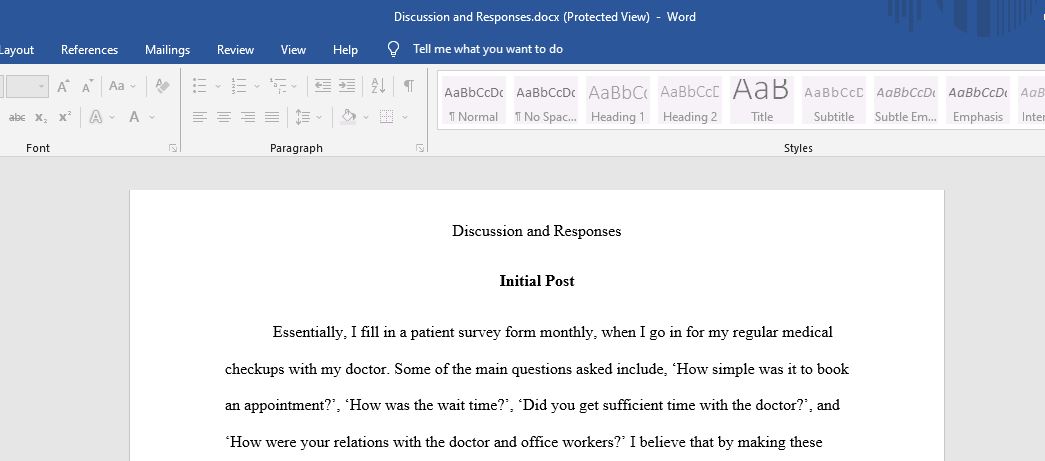Discussion and Responses on Patient Satisfaction Surveys.
Think of a time when you completed a satisfaction survey for a business, doctor’s office or other organization. What types of questions did they ask? What would you assume they are trying to accomplish with their survey? How can this type of data be used to determine organizational action?
Michelle Mattson posted Apr 11, 2020 8:03 PM
I do not remember any specific surveys I have taken from a doctor’s office, of which would be a great example to relate to the material we learn in this class, but I am offered a satisfaction survey when I order items from Amazon prime. As soon as my package is dropped off, I receive a survey that asks, “How was the quality of our service?”, “Was the package delivered in a timely manner?”, and “Would you buy this item again?”. Amazon prime is looking for how their customers view their service and a general idea of how their delivery workers handle the packages. A survey where the customer says the package was poorly handled/damaged or was delivered well past the expected delivery time may show Amazon which of their deliverers is not meeting quality standards. Positive survey results can show Amazon how well their deliverers meet standards or what products customers will want to purchase. By analyzing the results of the survey, Amazon can act when an employee does not meet quality standards or fix a service issue that multiple customers are experiencing. Healthcare facilities use surveys for similar reasons. They can gather negative or positive feedback to increase the quality of their service to ensure the well-being and privacy of patients. They may try to find a new approach of sending information to patients or how appointments are set up. Surveys filled out by patients and stakeholders can provide healthcare professionals great insight as to how high the quality of their service is.
Dena Curtis posted Apr 11, 2020 7:24 PM
I do a survey every month when I complete online Relias training for my job. Our healthcare training company through Relias, asks us about 10 questions after each training module. Some of the questions are: Did you find this module appropriate to your job?; Was this module easy to use and understand?; Did you find this training helpful in the event of a fire?
Those are some of the questions that are in the surveys after completing monthly training modules at work. After those types of questions, there are also a few questions where the employees can make suggestions for improvements, etc.
I would say the company is making sure that their training and refreshing modules are staying efficient, effective, and user-friendly, so they can continue to improve any that they receive improvement suggestions on, keep and add more clients, maintain their learning module trainings for their customers, etc.
The type of data that Relias uses can help companies remain compliant with constant changing regulations, to be able to track and report on online courses and more. Relias uses the data it collects to give companies expanded tracking options to all them to manage the different types of learning that is needed throughout the organization. Because many organizations have more than one department and need to keep updated on various types of learning. Relias also helps each healthcare client keep track of all employees and their completions of their online training through Relias, it is detailed breakdown of completion and compliance statistics for each assigned document or by each individual staff member, (Relias, 2020). If this data isn’t kept up with, it is possible the healthcare company could fall behind on important healthcare regulations, and staff could become less involved in their job duties and even what to do when it comes to an emergency such as a fire, active shooter, or sexual abuse, etc. It is crucial for companies to keep up on regulations, laws, and educational training in accordance to their state, federal laws, and their jobs. Healthcare companies could suffer fines, lose profit, lose customers, and lose staff if these types of data aren’t maintained. In addition, the patients could suffer, staff members could suffer, and even healthcare industry itself would lose out on many things if the data is not collected and properly maintained and organized.
Reference
Relias. (2020). Learning Management System tracking and Reporting. Relias, LLC. Retrieved from https://www.relias.com/product/learning-management-system/tracking-and-reporting
Dena Curtis
Answer preview:

word limit: 416
